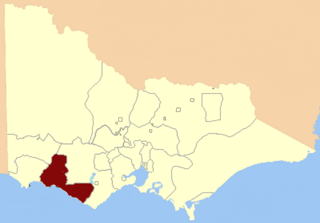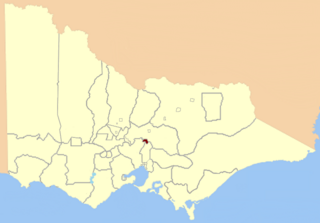Related Research Articles

Kilmore is a town in the Australian state of Victoria. Located 65 kilometres (40 mi) north of Melbourne, it is the oldest inland town in Victoria by the combination of age and physical occupation, and because it had unique agricultural attributes to drive that earliest settlement. It grew very rapidly to become four times bigger than its nearest inland rival by 1851. Its spectacular growth continued to match that of the major gold mining towns of Ballarat, Bendigo and Beechworth until at least 1861.

The electoral district of Melbourne is an electorate of the Victorian Legislative Assembly. It currently includes the localities of Docklands, Carlton, Melbourne, East Melbourne, West Melbourne, North Melbourne, Parkville, Newmarket, Kensington and Flemington, and includes Melbourne University. The district has been in existence since 1856.
The Electoral district of Kilmore, Dalhousie and Lancefield was an electoral district of the Victorian Legislative Assembly. It was created by the Electoral Act Amendment Act 1888, taking effect at the 1889 elections. The electoral district of Kilmore, Dalhousie and Lancefield replaced Electoral district of Dalhousie.

The electoral district of Anglesey was an electoral district of the Legislative Assembly in the Australian state of Victoria.
This is a list of members of the Victorian Legislative Assembly from 1935 to 1937, as elected at the 1935 state election.

Members of the Victorian Legislative Council, the upper house of the Parliament of the Australian State of Victoria, are elected from eight multi-member electorates called regions. The Legislative Council has 40 members, five from each of the eight regions.
John Gavan Duffy was an Australian politician, member of the Victorian Legislative Assembly.
Reginald Alfred John James was an Australian politician. He was a Country Party member of the Victorian Legislative Assembly from 1943 to 1944, representing the electorate of Bulla and Dalhousie.

Villiers and Heytesbury was an electoral district of the Legislative Assembly in the Australian state of Victoria from 1856 to 1904. It was based in western Victoria, and included the area from Lake Corangamite along the coast westward past Port Fairy.

Kilmore was an electoral district of the Legislative Assembly in the Australian state of Victoria centred on Kilmore from 1856 to 1877. It was superseded in 1877 by Kilmore and Anglesey.

Dalhousie was an electoral district of the Legislative Assembly in the Australian state of Victoria from 1859 to 1927. It was based in north-western Victoria. The district had been named Electoral district of Anglesey. The district of Dalhousie was defined in the 1858 Electoral Act as :
THE ELECTORAL DISTRICT OF DALHOUSIE.
ANGLESEY. Bounded on the west by part of the eastern boundary of the County of Dalhousie, namely, by the River Goulburn from the confluence of Hughes's Creek to the confluence of Dabyminga Creek; thence by Dabyminga Creek to its source in the Great Dividing Range; on the south by the Great Dividing Range to the main source of the River Goulburn; on the east by the range dividing the waters of the main source of the Goulburn and Big Rivers from those of the Rubicon and Snod-por-dock Creek northward to Mount Torbrick; thence by Jerusalem Creek to its confluence with the River Goulburn; thence by the River Goulburn to the confluence of the River Delatite; thence by the River Delatite and its north-west arm to the Dividing Range between the last named arm and Septimus Creek; and on the north by that range to the source of Hughes's Creek; and thence by Hughes's Creek to its confluence with the River Goulburn, excepting the country included in the Boroughs of Seymour and Avenel ... DALHOUSIE. Commencing at the junction of the Rivers Campaspe and Coliban; thence by a line south-easterly to the source of the Mclvor or Patterson's Creek; thence by a line north-east to the confluence of Hughes's Creek with the River Goulburn; on the east by the River Goulburn until it joins the Dabyminga Creek, by that creek to its source in the Dividing Range; on
the south by the Dividing Range to the source of the River Coliban; and on the west by the last mentioned river to its junction with the River Campaspe, being the commencing point, excepting the country included in the electoral districts of the Kyneton Boroughs, Murray Boroughs, and Kilmore.
Kilmore and Anglesey was an electoral district of the Legislative Assembly in the Australian state of Victoria centred on the town of Kilmore from 1877 to 1889.

The Electoral district of City of Melbourne was one of the original sixteen electoral districts of the old unicameral Victorian Legislative Council of 1851 to 1856; Victoria having been made a separate colony in Australia in the former year.
A by-election for the seat of Dalhousie in the Victorian Legislative Assembly was held on Thursday 31 January 1924. The by-election was triggered by the death of Nationalist member Allan Cameron on 28 December 1923.
This is a list of members of the Victorian Legislative Assembly, from the elections of 11 May 1877. Victoria was a British self-governing colony in Australia at the time.
This is a list of members of the Victorian Legislative Assembly, from the elections of 28 March 1889 to the elections of 20 April 1892. There were 95 seats in the Assembly from 1889, up from 86 in the previous Parliament.
This is a list of members of the Victorian Legislative Assembly, from the 1902 state election held on 1 October 1902 to the 1904 state election held on 1 June 1904. From 1889 there were 95 seats in the Assembly.
Harry Owen White was an Australian politician. He was a United Australia Party member of the Victorian Legislative Assembly from 1932 to 1943, representing the electorate of Bulla and Dalhousie.

Willowmavin is a locality in central Victoria, Australia. The locality is in the Shire of Mitchell local government area, 73 kilometres (45 mi) north of the state capital, Melbourne.
This is a list of electoral results for the electoral district of Bulla and Dalhousie in Victorian state elections.
References
- ↑ Hughes, Colin A. (1975). Voting for the Victorian Legislative Assembly, 1890-1964. Dept. of Political Science, Research School of Social Sciences, Australian National University. ISBN 070811332X.
- ↑ "Dalhousie By-Flection". Kilmore Free Press (MORNING ed.). Kilmore, Vic.: National Library of Australia. 7 February 1924. p. 2. Retrieved 11 October 2013.